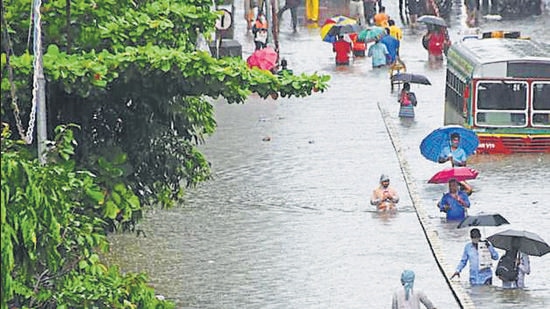A ‘Mumbai model’ for climate action: Lessons from the pandemic
The monsoon, each year more mercurial and menacing, will likely once again involve widespread flooding and damage. To address these challenges, instead of episodic and piecemeal steps, Mumbai needs a range of proactive measures
Mumbai is one of 43 Indian cities amongst the world’s 100 most imperiled by climate-related threats, according to a recent global risk assessment. Cyclone Tauktae’s impact on the city could have been much worse. These extreme weather events indicate that the climate crisis has arrived. The monsoon, each year more mercurial and menacing, will likely once again involve widespread flooding and damage. To address these challenges, instead of episodic and piecemeal steps, Mumbai needs a range of proactive measures.

For climate action, the city can emulate principles informing its Covid-19 response, termed the “Mumbai model” by stakeholders including the Supreme Court’s Justice DY Chandrachud. Over the last year, political leaders and the Brihanmumbai Municipal Corporation (BMC) have directed resources towards averting a public health disaster. Here are three practices used to tackle the pandemic that can inform Mumbai’s climate change readiness.
First, like how Mumbai has deferred to data and doctors about Covid-19, science and experts should guide the city’s climate plans. The BMC must evaluate indicators over varied time horizons: urgently assessing flood prone areas for the coming monsoon; analysing Mumbai’s vulnerability to weather-related disasters and disparities in air pollution and heat between neighbourhoods; and adapting to longer trends like sea level rises and urbanisation due to rural distress. This evidence can help Mumbai create measurable targets about improving infrastructure’s absorptive capacity, enhancing air quality, reducing emissions, increasing public transport ridership, and building affordable and energy efficient homes. This will signal the BMC’s seriousness about improving citizens’ quality of life and safeguarding the economy.
Also Read | Coast guard rescues 47 crew members from barge Gal Constructor off Palghar coast
Second, Mumbai minimised some of the devastating impacts of Covid-19’s second wave by investing in testing facilities and building additional capacity of beds and oxygen storage. Similarly, the BMC needs to rapidly ramp up infrastructure to deal with climate-related challenges. For disaster preparedness, Mumbai should secure its electricity supply and build reserve systems for water and power. Guided by data and research, the BMC should upgrade drainage systems and reevaluate ill-conceived projects that only accentuate risk. Building guidelines should emphasise low-rise high density development, mixed use planning and pedestrian access. This will reduce energy consumption from cooling and transportation. Low-rise buildings are also less vulnerable to high intensity winds during cyclones, which are expected more frequently because of a warming Arabian Sea.
Crucially, in addition to minimising grey infrastructure’s ecological footprint and emissions, Mumbai must conserve blue and green infrastructure. The Maharashtra government’s declaration of Aarey as a reserve forest and expansion of the eco-sensitive zone around the Thane Creek Flamingo Sanctuary are welcome steps. Studies show that mangroves, wetlands and intact ecosystems are more effective and less expensive than artificial barriers in mitigating climate disasters. The underlying logic of protecting and bolstering nature should be extended urgently and uniformly.
Third, Covid-19 has demonstrated how an informed and empowered administration is essential to crisis response. Mumbai must develop institutional capacity so that its officials can govern the complexities of the climate crisis. The decentralisation of power during the pandemic from the chief minister to the municipal commissioner and, in turn, to ward officials will also be critical to climate action. Participatory planning about issues like managing waste and increasing green cover can diminish damage from climate disasters. With incentives for civic participation, Mumbai can create more livable microclimates through community gardens and rooftop farms serving as twenty-first century sacred groves.
Also Read | Cyclone Tauktae: Bandra-Worli sea link now open for commute, tweets BMC
Institutional capacity will also be required to facilitate interdepartmental coordination for issues that don’t fall within the BMC’s sole jurisdiction and require navigating layered bureaucracies across multiple agencies and ministries. For instance, the BMC’s collaboration with the Indian Railways and BEST to upgrade and maintain its suburban rail and bus systems will be key to ensuring affordable and green public transportation.
With its culture, commerce, capital and capabilities, Mumbai’s considerations to tackle the pandemic and climate crisis are unique. These assets should be leveraged towards addressing the coastal city’s concentration of risk in a warming world. India’s financial capital will only be a viable home for its millions of residents and an engine of economic growth if the BMC uses all its resources towards building climate resilience. For its pandemic response, the local administration has eschewed magical thinking and instead opted for consultative, competent governance. Similarly, the city should not count on miracles to deal with the climate crisis; instead, it must build back better through principles of the Mumbai model.
Aaran Patel is an MPP Candidate at the Harvard Kennedy School of Government
The views expressed are personal
Continue reading with HT Premium Subscription




